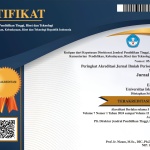Implementation of Cyber Notary as a Notary Transformation in the Digital Economy Era (Comparative Study of German Notary Law)
Abstract
The process of implementing the Cyber Notary concept in Indonesia still faces various obstacles due to the provisions in Law No. 2 of 2014 concerning Amendments to Law No. 30 of 2004 concerning the Position of Notary or abbreviated as UUJN which still applies the principle of " Tabellionis Officium Fideliter Exerbo" and several articles in the UUJN which are still traditional. This article analyzes the opportunities and obstacles to implementing Cyber Notary in the Indonesian legal system in facing the Digital Economy era, and elaborates on the best practices of German notary law which has previously implemented the Cyber Notary concept. This article is a legal research with a socio-legal approach, namely that which is related to law and technology and a comparison of notary law with Germany. The results of this study are that there are still several regulations that hinder the entry of the Cyber Notary concept in Indonesia so that changes are needed to the UUJN and the formation of other regulations that support this concept, but on the other hand there is an opportunity for the Cyber Notary concept to be implemented, as stated in the explanation of Article 15 number (3) of the UUJN which is the entry point for the Cyber Notary concept. In order to make changes to the UUJN, Indonesia can make Germany a rule model because it has previously implemented the Cyber Notary concept and has succeeded in integrating digital technology into Notary practices, such as the use of digital signatures, the use of video conferencing and the storage of electronic document archives.
Keywords
Full Text:
PDFReferences
Journals:
Ahmad Rifaldi & Habib Adjie. (2022). Minuta Akta Notaris dan Bentuk Elektronik. Hukum Bisnis, 6.
Alwajdi, M. F., & Kunci, K. (2020). Kemudahan Berusaha Di Indonesia. 9, 257–274.
Ayu, V., Tolinggar, S., Latumeten, P., Covid-, P., Ayu, V., Tolinggar, S., & Latumeten, P. (n.d.). Urgensi Penggunaan Remote Notary Oleh Notaris Pasca Remote notary salah satu solusi mengatasi keadaan di Indonesia akibat pandemi Covid-19 . Namun , Notaris sebagai pejabat umum yang menjalankan. 5(2), 663–677.
Bahri, S., Yahanan, A., & Trisaka, A. (2019). Kewenangan notaris dalam mensertifikasi transaksi elektronik dalam rangka cyber notary. 8(2), 142–157. https://doi.org/10.28946/rpt.v
Di, S., & Globalisasi, E. R. A. (2022). Jurnal Kalacakra. 03, 65–71.
Koos, S. (2023). Jurnal Studi Sosial Hukum Indonesia Digitalisasi Tugas Kenotariatan - Tinjauan Komparatif dan Prospek ’ Cyber Notary ’ di Indonesia dan Jerman Digitalisasi Tugas Kenotariatan - Tinjauan Komparatif dan Prospek ’ Cyber. 2(2). https://doi.org/10.54828/ijsls.2023v2n2.1
Law, W. C., Traditions, C. L. A. W., Lubis, I., Murwadji, T., Siregar, M., Sukar-, D., & Utara, U. S. (2022). Jurnal IUS Kajian Hukum dan Keadilan. 10(1), 1–11.
Mayana, R. F., & Santika, T. (2021). Legalitas Tanda Tangan Elektronik: Posibilitas Dan Tantangan Notary Digitalization Di Indonesia. Acta Diurnal Jurnal Ilmu Hukum Kenotariatan Dan Ke-PPAT-An, 4(2), 244–262. https://doi.org/10.23920/acta.v4i2.517
Nurita, R. . E. (2012). Cyber Notary:Pemahaman Awal dalam Konsep Pemikiran. Refika Aditama.
Pamungkas, J. R., Suryadi, S., & Efritadewi, A. (2021). ANALISIS KEPASTIAN HUKUM AKTA TERHADAP KEWENANGAN NOTARIS DALAM PELAYANAN BERBASIS ELEKTRONIK (CYBER NOTARY). Student Online Journal (SOJ) UMRAH-Ilmu Sosial Dan Ilmu Politik, 2(1), 633–645.
Pangesti, S., Darmawan, G. I., & Limantara, C. P. (2020). Konsep Pengaturan Cyber Notary di Indonesia. Rechtsidee Notarial Journal, 7.
Rarasmitha, D. A. (2023). Pemenuhan Penilaian Aspek Transaksi Berjaminan Dalam Business Ready ( B-READY ) Sebagai Upaya Perbaikan Iklim Investasi Indonesia. 1(3).
Riyanto, H. R. B. (2020). Pembaruan Hukum Nasional Era 4.0. Jurnal Rechts Vinding: Media Pembinaan Hukum Nasional, 9(2), 161.
Rumengan, P. V. (2021). Analisis Akta Notaris Dalam Era Cyber Notary Ditinjau Dari Asas Tabellionis Officium Fideliter Exercebo. 3.
Sugiarti, I. (n.d.). Kepastian Hukum Terhadap Penerapan Dan Pemanfaatan Konsep. 13–20.
Books:
Adjie, H. (2020). Problematika Dan Solusi Terpilih Tentang Hukum Kenotariatan Indonesia. Bandung:PT. Citra Aditya Bakti.
IKANO UNPAD. (2023). Cyber Notary dan Tantangan Notaris di Era Digital. Bandung:PT Rafika Aditama ed.
Sitompul, J. (2012). Cyberspace, cybercrime, cyberlaw, Overview Aspect Law Criminal, Jakarta: PT. Tatanusa.
Internet:
Fitri Novia Heriani. (2021). Presiden Ingin Indonesia Masuk Kategori Negara Mudah Berbisnis. Hukum Online Com. https://www.hukumonline.com/berita/a/presiden-ingin-indonesia-masuk-kategori-negara-mudah-berbisnis-lt6115054b41f51/. Diakses pada 23 April 2025
Hukum Online. (n.d.). Presiden Minta Pola Kerja Notaris Berubah, Begini Tanggapan INI. https://www.hukumonline.com/berita/a/presiden-minta-pola-kerja-notaris-berubah--begini-tanggapan-ini-lt5de0fe8832c1b/. Diakses pada 23 April 2025
Regulation:
Civil Code
Law No. 2 of 2014 concerning Amendments to Laws
Number 30 of 2014 concerning the Position of Notary
Law No. 11 of 2008 concerning Electronic Information and Transactions.
DOI: https://dx.doi.org/10.30659/jdh.v8i2.45649
Refbacks
- There are currently no refbacks.
View My Stats

This work is licensed under a Creative Commons Attribution 4.0 International License.
Jurnal Daulat Hukum has been indexed in:

